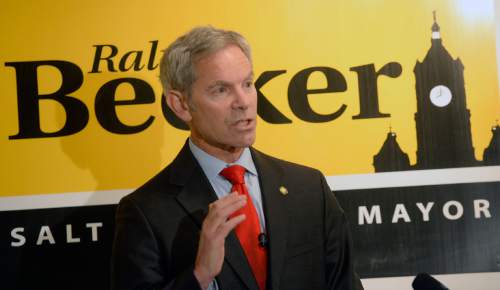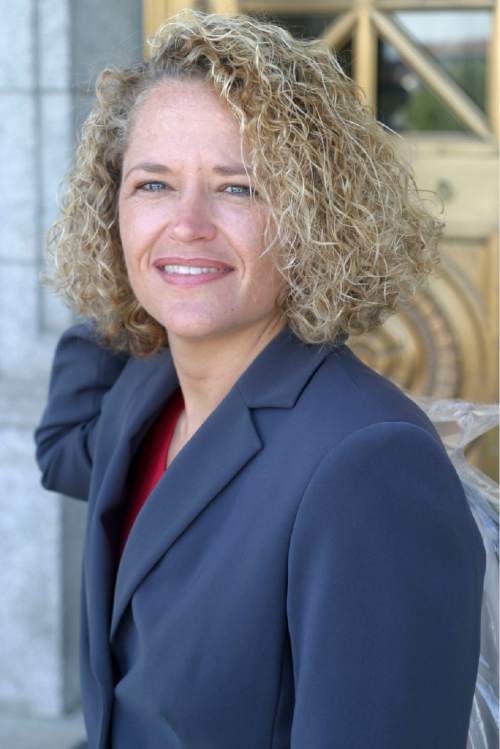This is an archived article that was published on sltrib.com in 2015, and information in the article may be outdated. It is provided only for personal research purposes and may not be reprinted.
Salt Lake City mayoral candidate Jackie Biskupski lashed out at Mayor Ralph Becker on Monday, alleging he cut a backroom deal surrounding the relocation of the state prison and a possible sales tax hike.
"Now the mayor has opened the door for a sales tax increase upon our residents," she said, "which, in turn, opens the door for the state prison to be dumped in Salt Lake City."
A bill that passed the Utah Legislature in its closing hours last week, HB454, added a provision for an optional sales tax increase for the city where the prison is ultimately moved.
Becker insists he continues to oppose a prison move to Salt Lake City. But he backs the potential sales tax hike if the capital does get the penitentiary. For years, the mayor has sought an additional funding stream to offset the impacts on his city from daily commuters and tourists.
The tax, a potential increase of up to 0.5 percent, would apply to visitors and residents alike — anyone who buys virtually anything in the city (big-ticket items such as cars, for example, are exempt). It would bring tens of millions of dollars to Salt Lake City coffers. Such a hike would have to be approved by the City Council.
Becker said he discussed the prison and the potential tax hike recently with the Prison Relocation Commission, because its members asked to meet with him.
In a news conference on the steps of City Hall, Biskupski said Salt Lake City residents want neither a tax hike nor a prison.
"So, I ask, whose agenda is the mayor pushing? Because it certainly isn't the agenda of Salt Lake City residents, at least none that I know."
Biskupski, who is a top administrator for Salt Lake County Sheriff Jim Winder and a former state legislator, said better economic development would produce funding to offset the ongoing impacts put on the city's resources by commuters and visitors.
"Mayor Becker would not be looking for a sales tax increase had he successfully built and retained a strong economic development team," she said. "But he hasn't."
Biskupski also faulted the two-term mayor for a lack of transparency.
"Insider, backroom deals like this undermine people's confidence in their government," she said. "But, for this administration, it's nothing new."
She pointed to the $119 million Eccles Theater going up on Main Street and the new bike lanes on 300 South as projects that lack community support.
In response, Becker said Monday his administration spent years in community discussions before moving forward with those projects.
"It was as transparent and open as I can image," he said of the mega-theater. "That's one of the reasons it took five years [of planning]."
The 300 South bike lanes were three years in planning, he added.
City Council Chairman Luke Garrott, who also is pursuing the mayor's seat, criticized Becker on Monday in a prepared statement. Garrott said the penitentiary should remain in Draper.
"Ralph's zealous pursuit of this sales tax increase shows a serious disconnect with the residents of Salt Lake City," Garrott said. "For eight years, radical increases in fees and fines have been a hallmark of Ralph's administration and residents and businesses have paid the price."
The bill passed by the Legislature gives the Prison Relocation Commission until Aug. 1 to select a new site for the lockup.
"Ultimately, the prison relocation debate highlights a dysfunctional relationship between Salt Lake City and the Legislature," Garrott said. "While the Utah Legislature rails against the federal government, they certainly don't appreciate Utah cities and towns deciding what's in our own best interests."
For his part, Becker makes no apologies for backing the right to boost the sales tax.
"It is absolutely true that for many years my administration has advocated for the Legislature to create such an option as a means of helping reduce the unfair burden shouldered by Salt Lake City taxpayers and create a way for visitors and the sizable commuter population to our capital city to contribute to the cost of city-funded services like police, fire and snow removal, which benefits all but is currently only paid for by Salt Lake City residents," he said in a news release. "Bottom line, my position has and continues to be no to locating a prison in Salt Lake City and yes to visitors offsetting the expense of providing government services to everyone who lives, works and plays in our great city."
Salt Lake City's primary election is Aug. 11. Two top vote-getters will advance to the Nov. 3 general election.





